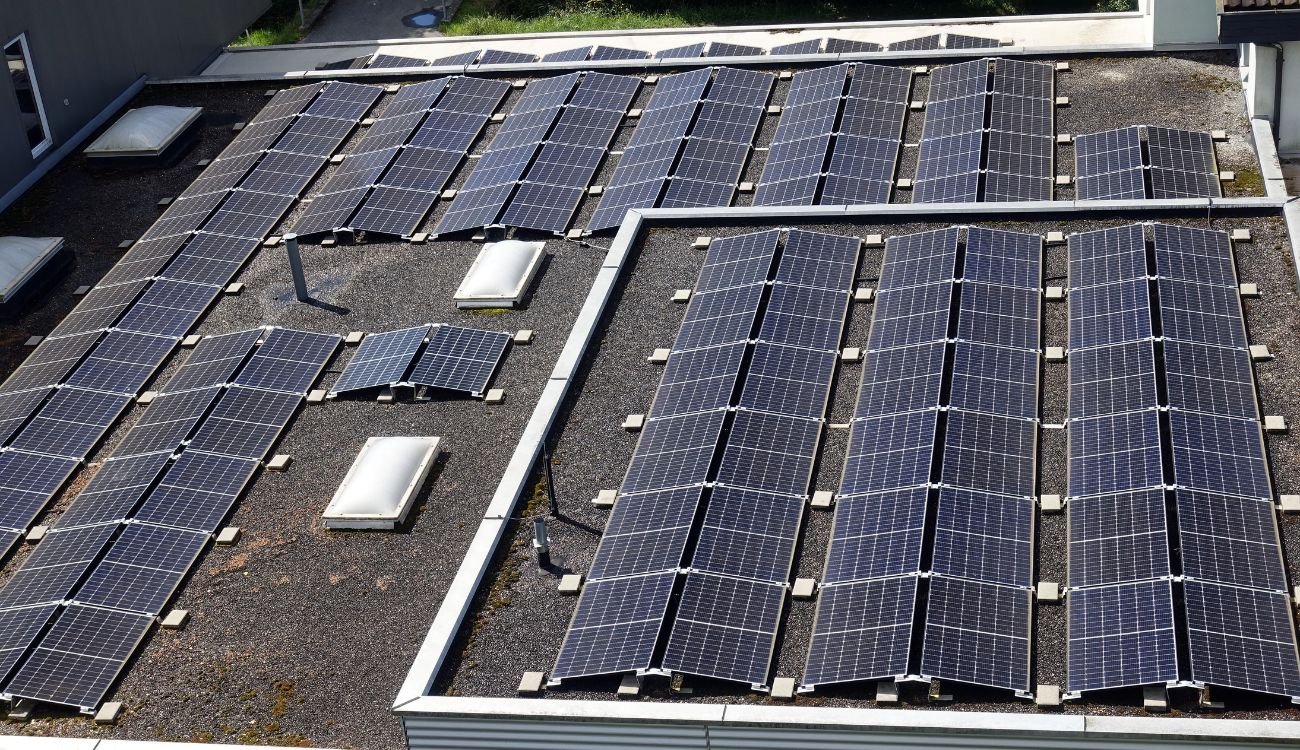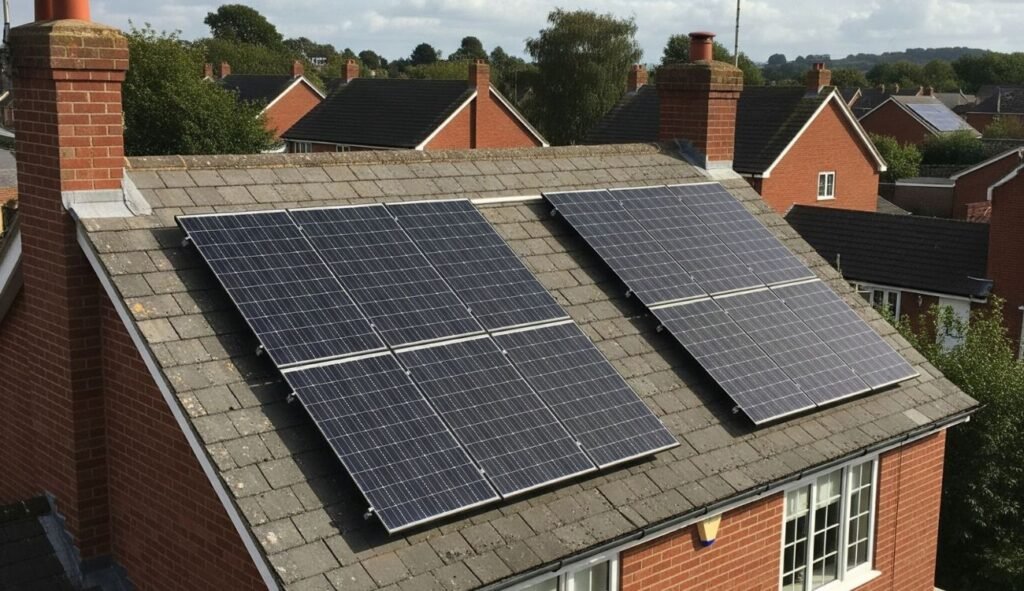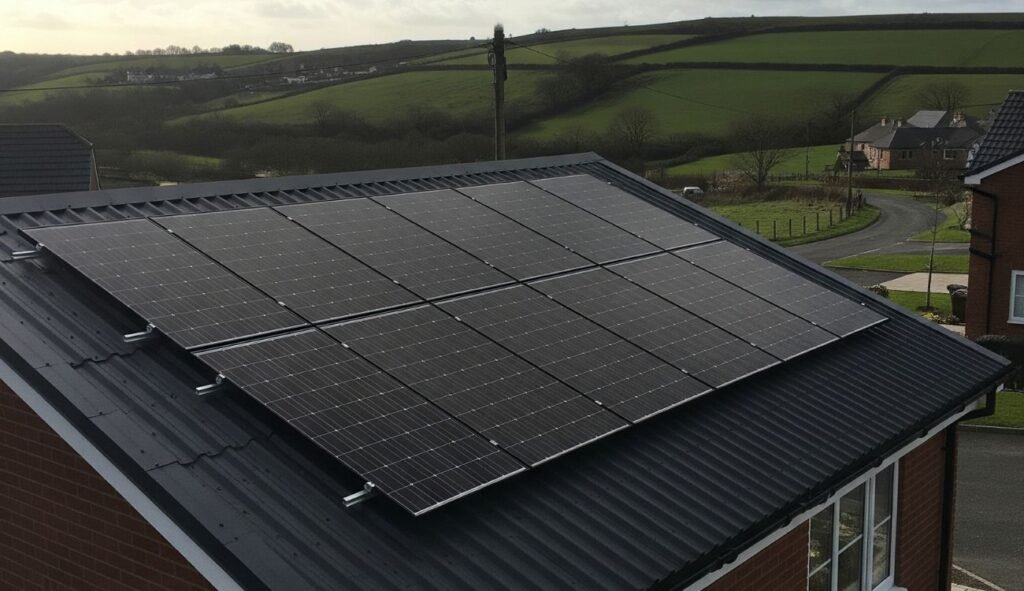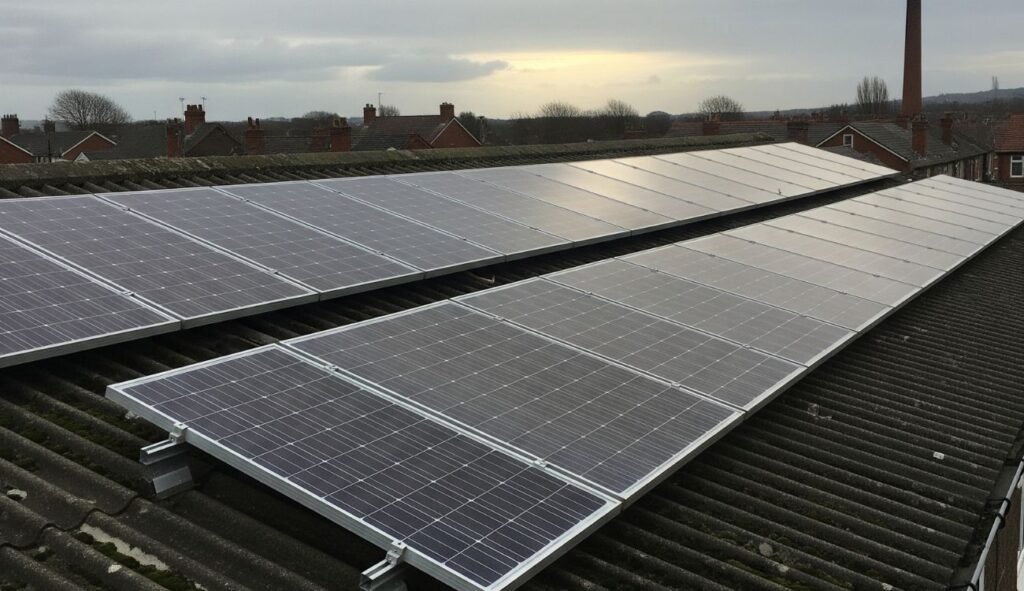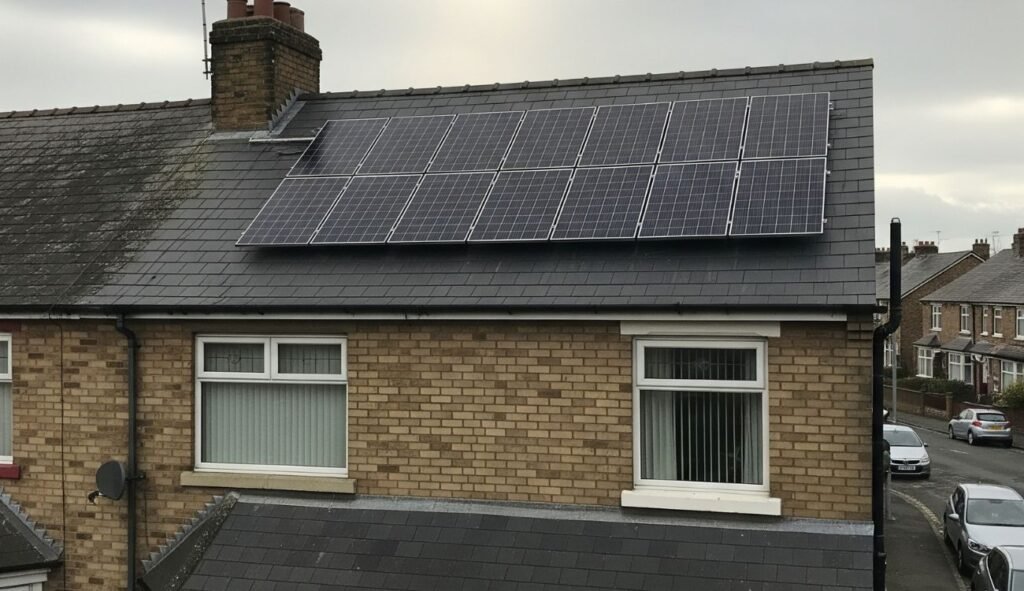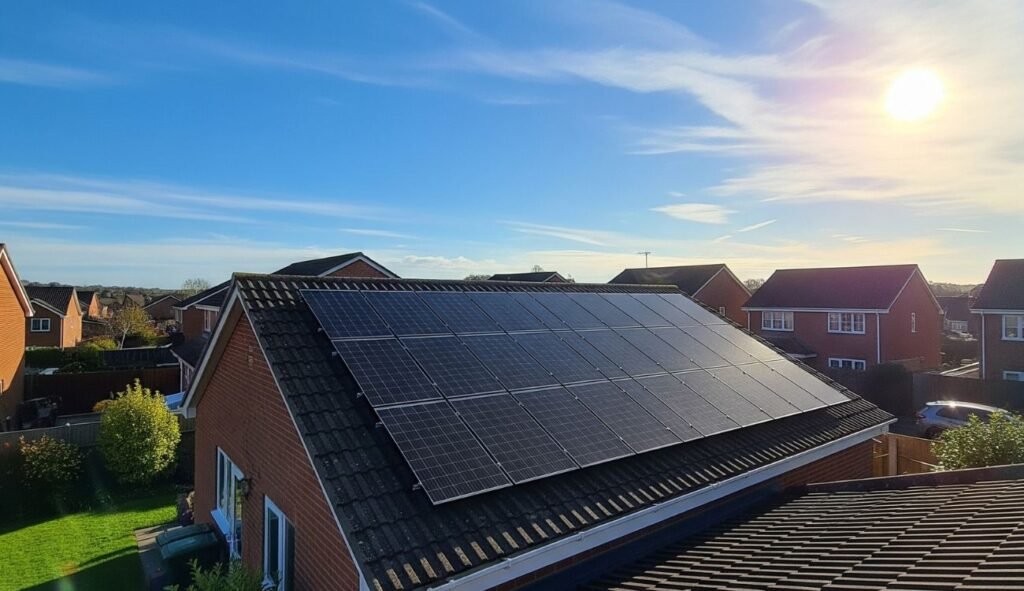With the UK government’s commitment to tripling solar capacity by 2030 and the increasing affordability of solar technology, many business owners are considering the switch to solar energy. But are commercial solar panels truly worth the investment? Let’s delve into the benefits, costs, and available incentives to help you make an informed decision.
Are Commercial Solar Panels Worth the Investment?
When considering commercial solar panels, the key question is whether the upfront investment delivers meaningful long-term value.
Beyond just reducing energy bills, businesses must weigh factors like installation costs, available government incentives, and potential savings to fully understand the financial impact.
In this section, we’ll break down the critical elements that influence the return on investment for commercial solar systems in the UK.
Financial Benefits
- Reduced Energy Bills: Installing solar panels can significantly lower your electricity expenses. By generating your own power, you reduce reliance on the grid, leading to substantial savings over time.
- Return on Investment (ROI): Commercial solar installations often achieve a payback period of 4 to 5 years, with ROI ranging between 16% and 45% . This makes solar a financially sound investment for many businesses.
- Energy Independence: Producing your own electricity shields your business from volatile energy prices and supply disruptions.
Environmental and Corporate Responsibility
- Carbon Footprint Reduction: Solar energy is clean and renewable, helping businesses reduce their environmental impact and contribute to sustainability goals.
- Enhanced Brand Image: Demonstrating a commitment to green energy can improve your company’s reputation among customers, partners, and stakeholders.
Ready to boost your green credentials while cutting energy costs? Future Heat is MCS certified and proudly serves Tyne and Wear, Newcastle, and the North East.
We help businesses meet sustainability goals with efficient, cost-effective solar solutions. Get your free solar panel quote today.
How Efficient Are Commercial Solar Panels?
Commercial solar panels are highly efficient. Modern systems typically convert 18% to 22% of sunlight into usable electricity. High-efficiency commercial modules, such as monocrystalline panels, can even reach 24%+ under optimal conditions.
Several factors influence overall efficiency and performance:
- Panel Type: Monocrystalline panels offer the highest efficiency, followed by polycrystalline and thin-film.
- System Design: Tilt angle, orientation, and shading play a critical role in how much energy your system generates.
- Location: Businesses in the North East of England, including Tyne and Wear and Newcastle, can still achieve strong efficiency levels due to long summer daylight hours and mild climates.
On average, a well-designed commercial system in the UK can generate around 850–1,100 kWh per kW installed per year, making solar a highly viable long-term investment.
On average, a well-designed commercial system in the UK can generate around 850–1,100 kWh per kW installed per year, making solar a highly viable long-term investment.
Curious about scaling up your setup? Check out our article on how many solar panels it takes to generate 1 megawatt and what that means for larger commercial systems.
What Are the Costs of a Commercial Solar Panel System?
The cost of a commercial solar panel system depends on the size of the property, electricity usage, and installation complexity. A key factor in calculating this is determining how many solar panels you will need to meet its energy demands efficiently.
Here’s a breakdown of typical property sizes, their energy consumption, system size recommendations, and potential savings with solar panels:
| Property Type | System Size (kW) | Avg. Annual Electricity | Typical Electricity Spend | Estimated Solar Savings | System Cost | Payback Period |
|---|---|---|---|---|---|---|
| Small Business (e.g., retail shop) | 10 kW | 15,000 – 20,000 | £3,000 – £4,000 | £1,500 – £2,500 (60% – 70%) | £10,000 – £25,000 | 4 – 6 years |
| Medium Business (e.g., warehouse) | 50 kW | 75,000 – 100,000 | £15,000 – £20,000 | £7,500 – £12,500 (60% – 70%) | £40,000 – £125,000 | 4 – 6 years |
| Large Enterprise (e.g., factory) | 250 kW | 300,000 – 400,000 | £60,000 – £80,000 | £37,500 – £62,500 (60% – 75%) | £175,000 – £500,000 | 4 – 6 years |
Note: Costs and savings are approximate and can vary based on location, energy usage, and specific installation factors.
If you’re unsure how much roof space you’ll need or whether you can accommodate a large system, our article on how many solar panels can fit on your roof offers a practical breakdown by property type and layout.
What Government Incentives and Schemes Are Available for Commercial Solar Panels?
To encourage the adoption of renewable energy, the UK government offers several incentives.
- Smart Export Guarantee (SEG): This scheme allows businesses to earn money by exporting surplus electricity back to the grid. Payments are made by energy suppliers for each kilowatt-hour (kWh) exported.
Do Solar Panels Increase Commercial Property Value?
In most cases, yes. Solar panel systems can enhance the value of commercial properties by making them more energy-efficient and attractive to future buyers or tenants.
Key benefits include:
- Lower operational costs: Future tenants or buyers see long-term energy savings as a major plus.
- Improved EPC ratings: Energy-efficient buildings are becoming more desirable, especially as sustainability requirements tighten.
- Competitive advantage: Businesses with net-zero or carbon-reduction goals are more likely to lease or buy energy-optimised buildings.
There may be minor considerations around business rates depending on your system type and ownership model, but in general, solar adoption is seen as a capital improvement, not a liability.
Can I Install Commercial Solar Panels on a Rented Commercial Property?
Yes, installing solar panels on a leased or rented commercial property is entirely possible, though it does require the cooperation of the landlord. In most cases:
- You’ll need written consent from the property owner.
- An agreement can be drawn up where both tenant and landlord benefit from reduced bills and increased property value.
- Power Purchase Agreements (PPAs) are a common workaround. A third party installs and owns the system, and the business buys the electricity at a reduced rate.
If you’re unsure where to begin, our guide on how to choose a solar panel installer walks you through finding the right provider to handle planning, installation, and permissions on your behalf.
Do You Need Planning Permission to Install Solar Panels on a Commercial Building?
In most cases, you do not need planning permission to install solar panels on a commercial building in the UK, as long as the installation meets certain criteria and remains within permitted development rights.
General rules for commercial solar installations:
- Panels must not protrude more than 200mm from the roof surface.
- The highest part of the panels must not exceed the highest part of the roof.
- The system must be sited to minimise visual impact on the surrounding area.
- Panels should be removed when no longer in use.
When planning permission is required:
- If your building is listed or in a conservation area.
- If you’re planning a ground-mounted system that’s over 9m².
- If the panels would be visible from the public highway on a building fronting the road (in certain areas).
It’s always a good idea to consult your local planning authority or a professional installer like Future Heat, who can advise you on planning and ensure full compliance.
Are Battery Storage Systems Necessary for Commercial Solar Panels?
Battery storage is optional, but it can significantly enhance the value of your commercial solar investment.
Here’s when a battery system may make sense:
- Your business operates heavily outside daylight hours
- You want to maximise self-consumption rather than exporting excess energy
- You want energy security and backup in case of outages
Without batteries, your system will still save money and earn you Smart Export Guarantee (SEG) payments for surplus power. For most SMEs, a grid-tied system without batteries already delivers excellent ROI.
If you’re unsure whether storage is right for your setup, read our guide on what size solar battery you would need or speak to Future Heat’s expert team for tailored advice based on your energy usage profile.
What Maintenance Is Required for Commercial Solar Panel Systems?
One of the most attractive features of solar panel systems for businesses is how little upkeep they require. Commercial solar panels are built to withstand tough weather conditions and are designed to be low-maintenance.
For most systems, maintenance simply involves:
- Periodic cleaning: Dirt, bird droppings, and debris can accumulate on panels, reducing efficiency. Cleaning 1–2 times per year is usually sufficient.
- Annual inspections: These help detect any wiring issues, inverter faults, or output irregularities before they become costly.
- Performance monitoring: Many systems include real-time monitoring dashboards that allow you or your installer to track performance and identify issues quickly.
Frequently Asked Questions (FAQs)
Commercial solar panels are highly efficient and typically maintain around 80–90% of their original output after 25 years. Most high-quality panels come with performance warranties guaranteeing minimal degradation, usually no more than 0.5% loss in efficiency per year. With proper maintenance and optimal installation, commercial systems can deliver reliable, long-term energy savings, making them a smart investment for UK businesses.
Yes, UK businesses can claim the cost of solar panels as a capital allowance. Under the Annual Investment Allowance (AIA), the full cost of installing solar panels may be deducted from taxable profits in the year of purchase. Additionally, commercial solar may qualify for the Full Expensing incentive introduced in 2023, allowing 100% first-year tax relief on qualifying plant and machinery. Always consult with a tax advisor to ensure your business claims all available reliefs.
Yes, as of now, commercial installations are subject to the standard 20% VAT rate in the UK. While domestic solar panel installations may benefit from a 0% VAT rate under certain conditions, this does not currently extend to businesses. However, VAT-registered companies can usually reclaim the VAT as input tax, depending on how the solar system is used in the business.
Yes, commercial solar is often highly profitable in the long term. UK businesses can reduce energy bills significantly, protect against rising electricity costs, and even generate income through Smart Export Guarantee (SEG) payments by exporting excess electricity back to the grid. With falling panel costs, government incentives, and rising energy prices, the return on investment for commercial solar typically ranges from 6 to 10 years, with ongoing savings thereafter for 20+ years.
The installation timeline for commercial solar panels varies depending on the system size and site complexity but generally takes between 2 to 6 weeks from initial survey to final commissioning. This includes time for site assessment, design, obtaining any necessary permissions, installation, and system testing. Working with an experienced installer like Future Heat helps streamline the process, ensuring minimal disruption to your business operations.
Our Verdict
So, are commercial solar panels worth it in the UK? For many businesses, the answer is a confident yes. With rising energy costs, generous government incentives, and the push toward net-zero, commercial solar panels offer a smart, future-proof investment.
They can significantly cut operational costs, boost sustainability credentials, and even increase the value of your commercial property. While factors like upfront cost, available roof space, and energy usage patterns matter, the long-term benefits, especially when paired with battery storage are undeniable.
Jamie Maguire is Managing Director at Future Heat Ltd, the UK-based renewable energy company specialising in heat pumps, solar panels and energy-efficient boiler solutions. He leads the company’s strategic vision to decarbonise homes and businesses across the UK by delivering innovative, sustainable heating and power systems. Jamie is passionate about shaping the future of energy, supporting communities and empowering teams of skilled engineers to deliver lasting value and carbon reductions nationwide.

